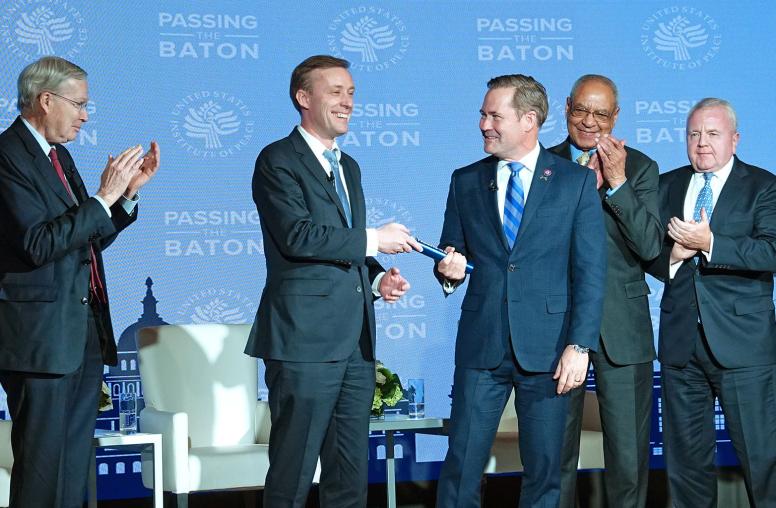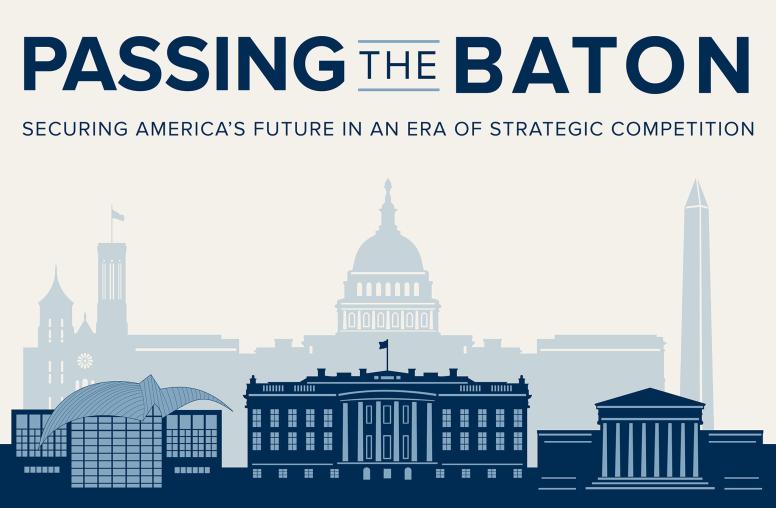Solomon Announces Transition in Institute of Peace Leadership
For Immediate Release: January 27, 2012
Contact: David Early, 202-429-7817
Allison Sturma, 202-429-4725
(Washington) - United States Institute of Peace President Richard H. Solomon announced yesterday that he will step down as the Institute’s chief executive on September 13, 2012. Solomon has led the organization for the past 19 years. Dr. Solomon told the Institute’s Board of Directors and staff, “With your support and hard work, USIP has grown from a small research and academic organization to a vital contributor to our country’s conflict management efforts around the world. I am confident that as the Institute transitions to new leadership, it will prove to be an even more valuable national security asset.”
The Institute was created by Congress in 1984 as an independent federal agency to research and analyze issues of non-violent conflict resolution. Today it is a national center for training and operations designed to prevent, manage and resolve international conflicts. Its publications in conflict analysis, bipartisan policy commissions such as the Iraq Study Group, and assessments on topics ranging from U.N. reform to genocide prevention, are widely respected as professional and innovative.
Former Secretary of State George P. Shultz, and former Board member Father Theodore M. Hesburgh noted that, “ . . . the Institute’s congressional charter [has given it] the opportunity to develop and apply innovative approaches to dealing with the conflicts of this new era in international affairs. The Institute [has become] a valued collaborator of the traditional agencies of government devoted to managing foreign policy and national security. . . . It also [works] constructively with nongovernmental and international organizations, creating new partnerships in conflict management.”
“Dick Solomon has transformed the Institute into an active and dynamic international problem solving organization. It is a model for how to deal with conflicts abroad,” said Institute Board Chairman J. Robinson West. “As our country faces continuing international challenges with fewer resources, the peacebuilding professionals of USIP are helping to resolve violent conflicts effectively and efficiently.”
“Peacebuilding has never been higher on the national security agenda than it is today,” said Solomon. “Our country faces new security challenges and political uncertainty, and it will take agile and innovative programs to help deal with them. Given current federal budgetary constraints, the Institute’s programs are highly cost-effective. Our partnering with the government’s foreign affairs agencies and nongovernmental organizations saves money and lives.” This led Gen. Anthony C. Zinni (USMC, ret.), commander in chief of the U.S. Central Command (1997-2000), to characterize USIP in The New York Times as America’s “special forces for foreign affairs and peace building.”
USIP currently manages peace and stability operations throughout the world, including full-time missions in Afghanistan, Iraq and Pakistan. In Iraq, USIP helped the U.S. Army’s 10th Mountain Division stabilize the restive province of Mahmoudiya through a historic reconciliation effort with Sunni and Shia tribal leaders. The Institute’s mediation established a new pattern of civilian-military cooperation for stabilizing a conflict zone. General David H. Petraeus, commander of the Multi-National Force – Iraq (MNF–I), called the operation “a striking success.”
In Afghanistan, Institute personnel supported the State Department and the Army’s 4th Infantry Division to help improve civil-military coordination among Afghan tribal leaders, government officials and American forces in the volatile eastern region. USIP is now training networks of local conflict mediators in provinces throughout Afghanistan. They resolve local disputes over land, property, and family, giving Afghans an effective problem-solving alternative to violence.
In Libya, the Institute deployed its conflict management professionals shortly after the NATO decision to intervene to protect Libyan civilians. The day Tripoli fell, Institute staff were on the ground, guiding more than one hundred Libyans to work as post-conflict mediators and facilitators who were able to respond rapidly throughout the country to prevent community-level violence. USIP remains on the ground in Libya, helping address post-conflict challenges. It is the only foreign organization with a seat on Libya’s ruling National Transitional Council’s stabilization team.
“The Institute today is considered a leading national center for the promotion of rule of law, religion and peacebuilding, civilian-military relations, and the role of media in peacebuilding,” said Ambassador George Moose, vice chairman of the Institute’s Board of Directors. “Its professional training academy, gaming and simulation activities, applied research and innovation provide the tools for transitions from conflict to peace around the world.”
In his recent discussion with the Board, Solomon said, “I am grateful for the opportunity to have played a role in the growth of this unique and valuable national institution for peace. The American people, through their Congress, had great wisdom and foresight in creating USIP. With ongoing support from Congress, the Institute has important opportunities to develop its professional training capacity and to build an international network of peacebuilding organizations.”
Past USIP presidents include University of Virginia constitutional and national security law professor Robert F. Turner (1986-1987) and former Ambassador Samuel W. Lewis (1987-1992).
###



